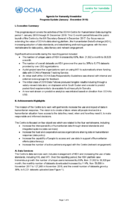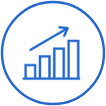This site is inactive as of February 2020. For updated information on an initiative's work, please refer to their own website as listed in their contact details.
Summary
The Centre for Humanitarian Data is focused on increasing the use and impact of data in the humanitarian sector. It is managed by the United Nations Office for the Coordination of Humanitarian Affairs (OCHA). The Centre’s services are available to humanitarian partners and OCHA staff in the field and at Headquarters free of charge.
The Centre’s activities will accelerate the changes required for the humanitarian system to become data driven. Humanitarian partners are collecting and sharing more data than at any other time. This trend will continue as more systems, sensors and people come online in crisis settings. How the humanitarian community handles this data revolution to inform decisions and improve lives will be a key determinant of its future effectiveness.
The Centre is a part of the Agenda for Humanity and supports the Sustainable Development Goals and Agenda 2030. The Centre is an example of a new way of working to embrace innovation and develop solutions together as one global community, enabling a step-change in how we respond to crises. Most critically, the Centre will ensure that data is a force for good and benefits humanity.
The Centre is focused on four areas: 1) data services; 2) data literacy; 3) data policy; and 4) predictive analytics. Our vision is to create a future where all people involved in a humanitarian situation have access to the data they need, when and how they need it, to make responsible and informed decisions.
Partners
The Centre is led by OCHA but brings together partners from the UN, NGOs, private sector, academia and governments to work together on common data challenges. The Centre was established with foundational funding from the Netherlands Ministry of Foreign Affairs and the City of The Hague. Additional support is welcome through direct funding, in-kind support, and personnel.

Goals
The main outcomes of the Centre for Humanitarian Data include:
- Speed of data: the Centre wants to speed-up the flow of data from collection to use – to shift from using outdated information to understand humanitarian crises to having data that reflects a current day, real-time understanding of a crisis.
- Connections in the network: the Centre wants to increase the number of its partners and to connect others through a shared data infrastructure and shared data goals.
- Increased use: the Centre wants to make sure data is used better and more often by the people who are making critical decisions in a humanitarian response. Data and related insights must be accessible to all humanitarian workers – technical and non-technical alike.
Resources





 summary
summary partners
partners goals
goals Stakeholder reports
Stakeholder reports resources
resources contacts
contacts